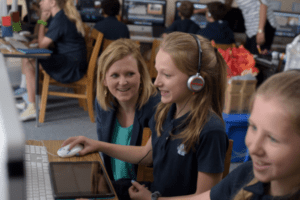Disclosure :: This post is sponsored by Ascension Episcopal School.
Parenting Bytes in the Digital Age: Creating Healthy Screen Time Habits
After a great work day, I picked my two kids up from daycare where I was reminded that the class scrapbook was due Wednesday.
After printing pictures, we hopped on over to the dollar store to purchase some stickers. Needless to say, after we searched every aisle for scrapbooking materials, we stumbled across the candy aisle where my three-year-old found the oh-so-tasty Hershey’s chocolate. “You’ve been a good boy for the past few weeks,” I say. “Yeah, Mom, I’m almost FOUR!” replies my son, excitedly. “Why not?” I thought. If we all have a piece, it will be gone before we know it.
Can you guess what happened throughout the week? Every time I picked up my almost four-year-old son from school, he begged and pleaded for chocolate. I gave him a piece, but ONE bar was not enough. He wanted TWO. Cue the tears and tantrums. Then, he needed THREE because “That’s how old I am!” At that point, I wondered why I even bought that pack of chocolate in the first place?!
Just as ONE chocolate bar was not enough, ONE episode of TV wasn’t satisfying either. So, I put my foot down. If I start giving into the limits I have set to ensure my son stays healthy, what problems am I causing for myself later down the line?
Let’s face it. Parenting in a world filled with temptations like chocolate, candy, and toys is hard.
Then, add to the mix electronic devices, media ads targeting our children, and the pressures of social media. Keeping our kids healthy in a technology-filled world can be exhausting.
How can you establish a healthy media diet for your family? What does this mean as a parent in the digital age? It varies by the age of your little ones, but it is never too early to begin healthy technology habits.
Set Limits Together
Whether you have a “threenager” or a teenager, kids need limits because self-control and decision-making skills are not fully developed until adulthood. As parents, it is important for us to discuss with our children why healthy screen time boundaries are needed and restrictions must be enabled. Ultimately, such conversations can aid in families deciding together what is fair, appropriate, and balanced for their household.
not fully developed until adulthood. As parents, it is important for us to discuss with our children why healthy screen time boundaries are needed and restrictions must be enabled. Ultimately, such conversations can aid in families deciding together what is fair, appropriate, and balanced for their household.
- A great way to enforce this is through a family media plan or device contract. These allow you to set expectations and follow through with them. Screen time contracts may also include chores or activities before screen time is awarded. Just as a potty chart was helpful as we struggled through potty training, a visual calendar or checklist of chores can be helpful with holding our kids accountable before earning time on devices.
- Learn about screen time controls on iPhones, iPads, Android devices, and Mac laptops.
Establish Routines
Whether you are wrangling your toddler to bed or dragging your teen by their toes to finish homework, routines such as the following are essential to healthy development:
- Keep devices out of bedrooms and place them in family locations. By doing this, you can limit the amount of screen time and preserve sleep patterns.
- Establish a bedtime routine with a charging station in your bedroom and expectations for turning in devices.
- Hold device-free dinners or better yet, try a device-free DAY! (This includes adults, too!)
Conversations are Necessary
When communicating with your children, show respect for their decision-making and never underestimate their capabilities. The choices they make online could be based on a lack of knowledge or experience.
- Discuss what your children should do if they encounter inappropriate content online, as incidents often go unreported because the child felt “it wasn’t a big deal.”
- Talk with your child about the dangers of sharing personal information, the presence of predators, and screen addiction.
- Explain the idea of a digital tattoo: everything we post is recorded and there to stay.
- Help your teen develop a positive online presence by discussing how recruiters are using social media.
Homework is Not Just for Kids
“Baby shark…doo doo doo doo….” I’ve got you singing it in your head now, don’t I? It may be the first video your kids watch on YouTube Kids, but don’t let the popular service’s name fool you. YouTube Kids is not always safe and dangerous content has made its way into seemingly innocent videos. To help safeguard your child, we offer the following suggestions:
- Do your research and enable security settings before allowing access to games or videos.
- Make YouTube searches safer and turn on Google Safe Search.
- Use Common Sense Media to check ratings on movies, shows, and games. See what parents are saying, age level recommendations, and more.
- Check out a couple of our favorite sites, Smart Social and ProtectYoungEyes, to help keep you current with technology trends via blogs and news articles.
Consider Management Apps and Tools
Many apps and tools for managing screen time and content are available. Find what works best for your family. Following are several that we’ve found useful: Circle OpenDNS Kidslox Bark
We strongly encourage you to be involved in your child’s online activity. Trust your gut. If you feel like something is inappropriate, unhealthy, or lacking balance, take action. We owe it to ourselves and our kids to be better digital citizens.
At Ascension Episcopal School, our technology department partners with students, teachers, parents, and the community to support the educational use of technology. We strive to help students maintain a healthy balance of technology at home and at school, while educating parents on what’s trending, tools to monitor online activity, and additional support and resources. You can view these short videos on our TechEd YouTube series by clicking here We are committed to educating and supporting parents to keep our kids alert, responsible, and ultimately safe while online.
About the Authors:
 Morgan Vondenstein is a working mom of two sweet boys, ages 1 and 4, and the Technology Integration Specialist at Ascension Episcopal School. As the founder of the Media Literacy program at the school, Morgan’s passion lies with video creation and integration. She works alongside students and teachers to spark creativity and passion for teaching and learning. Lover of all things Apple, Morgan is a certified Apple teacher, Apple Learning Specialist, and Apple Distinguished Educator.
Morgan Vondenstein is a working mom of two sweet boys, ages 1 and 4, and the Technology Integration Specialist at Ascension Episcopal School. As the founder of the Media Literacy program at the school, Morgan’s passion lies with video creation and integration. She works alongside students and teachers to spark creativity and passion for teaching and learning. Lover of all things Apple, Morgan is a certified Apple teacher, Apple Learning Specialist, and Apple Distinguished Educator.
 Rachel Delcambre, Common Sense Educator, is a mom of two young girls and serves as Ascension’s Educational Technology Specialist. As founder of the Upper School Makerspace, and initiator of the 1:1 laptop program, Rachel’s passion lies in hands-on learning, design thinking, and utilizing technology to enhance teaching and learning while educating students and parents on staying safe in the digital age.
Rachel Delcambre, Common Sense Educator, is a mom of two young girls and serves as Ascension’s Educational Technology Specialist. As founder of the Upper School Makerspace, and initiator of the 1:1 laptop program, Rachel’s passion lies in hands-on learning, design thinking, and utilizing technology to enhance teaching and learning while educating students and parents on staying safe in the digital age.
Ascension Episcopal School is committed to educational excellence in a Christian environment. Honored three times as an Apple Distinguished School, students in grades 1 through 12th have 1:1 access to iPads or Apple laptops. The mission of the technology department is to establish an innovative, collaborative learning environment which fosters empowered lifelong learners, creative problem solvers, and critical thinkers. As adaptable technology-users, it is our goal for students and teachers to responsibly communicate and contribute their God-given talents globally.
Learn more about Ascension Episcopal School ::
Website | Facebook | Instagram | Twitter


















